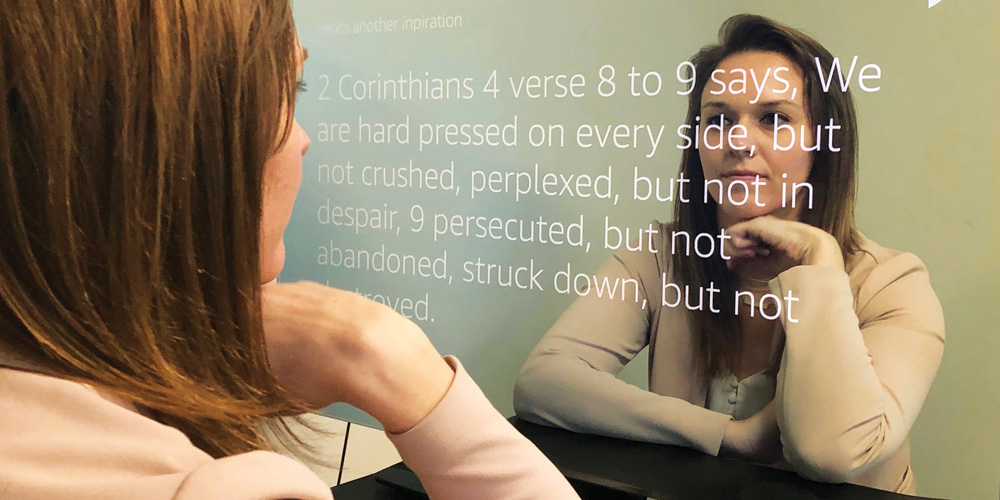Magazine

Reflections That Transform
Fall 2019
Chloe Buckler
Imagine looking into the mirror in your dorm room, getting ready for another day of classes, and asking your mirror for the location of your next class, an update on your to-do list, and to order your Starbucks for pickup.
It might sound like something out of science fiction, but for students at Oral Roberts University (ORU) in Tulsa, Oklahoma, this type of experience can be their reality. With the help of the new MQ Mirror, designed and created at ORU, the university is revolutionizing the way in which the physical world meets the digital. Mirrors, normally used to reflect reality, can now be used as a gateway into the digital world, bringing all areas of digital life into one convenient location to support a user’s physical, academic, social, and personal needs. The MQ Mirror not only has the potential to transform the way in which humans interact with technology, but it also reflects a form of worship through innovation by the desire of the mirror’s creators at ORU to glorify the ultimate Creator.
Inspired by the fitness world using mirror technology to enhance fitness experiences, Mike Mathews, ORU’s vice president of technology and innovation and the original designer of the MQ Mirror, wanted to harness that technology for higher education. Working with ORU’s AI software designer Jesupelumi Wickliffe and senior programmer Larry Moss, Mathews and his team created the mirror within a month’s time earlier this year.
ORU has now placed 10 different mirrors throughout their campus, and some classrooms are fitted with the technology, Mathews says. The mirror is also available for purchase by students, and ORU desires to continue to make the mirror more accessible to students and staff alike.
ORU has already received several awards for innovations like the MQ Mirror, including the 2018 EllumiNation Technology Award, which recognizes higher education visionaries who are creating lasting change through technology. The mirror was a big part of Mathews being recognized as one of Industry Era’s 2019 Top 10 Technology Leaders. Additionally, after a demonstration to Houston’s mayor through Lone Star College’s Day of Innovation event, the MQ Mirror was part of the Houston Business Journal’s 2019 Innovation of the Year competition.
It has also gained attention at other organizations worldwide, Mathews says. “The mirror is currently being purchased abroad in India as a means to help churches, education, and abusive situations,” he says, adding that other universities are exploring using the mirror to aid with addiction rehabilitation.
The technologically advanced mirror essentially has all the functions of a smart phone or other smart device – without the user having to touch anything. Not only can the mirror perform artificial intelligence functions, but it can also utilize popular applications as well for entertainment, music, self-help, and personal data analytics. By harnessing the power of all of these different pieces of technology, the MQ mirror streamlines processes for users to address their holistic needs.
Over the last few years, ORU has worked to streamline all online databases, making the MQ Mirror the perfect central hub for students, faculty and staff alike, Mathews says. For example, to address physical fitness, the mirror can sync with popular workout applications to outline daily fitness goals and stats.
The mirror was also outfitted with specific functions to address the academic needs of students. By connecting to ORU’s online academic portal, the mirror enables students to audibly ask the mirror for information relating to their grades, outstanding projects, and class information, and they can even access a personal “productivity” metric. For campus leaders like Kathaleen Reid-Martinez, ORU’s provost and chief academic officer, the mirror represents a significant step forward. “The AI-enabled MQ Mirror is a major breakthrough that finally allows all the campus education systems to be integrated and provide my life-long dream of personalized and adaptive learning,” she says.
For those struggling with addiction or emotional distress, the MQ Mirror is also outfitted to connect students with campus resources in real time and can act as a confidential and approachable way for users to access appropriate assistance. Since a 2017 survey by the American College Health Association found that 63.4% of students had felt “overwhelming anxiety” and 41.9% said they “felt so depressed that it was difficult to function” at some point within the previous year, the mirror’s technology could provide a key resource to struggling students. Not only can it connect students with a counselor via video chat, but it was also programmed to enable students to access spiritual resources, including the Bible app, and features an “encourage me” function.
Perhaps most uniquely – and most importantly – the mirror’s technology puts the “human” back as the focus of the human technology relationship. As ORU president William Wilson says, “The AI-enabled MQ Mirror has captured the attention of the education community, as it allows a fresh approach to serving students with vital educational information in both an audible and visual manner. We are proud to know this innovation has been designed right here at Oral Roberts University.”
The ultimate goal for the mirror, Mathews says, is that it reminds users of the reflection of God’s creativity and innovation within humanity. “We believe that God has created everyone to be creative and innovative through their talents and giftedness,” he says.
CHLOE BUCKLER is a graduate student at Pepperdine University in Malibu, California, pursuing her Masters in Public Policy, and an assistant resident director on campus.